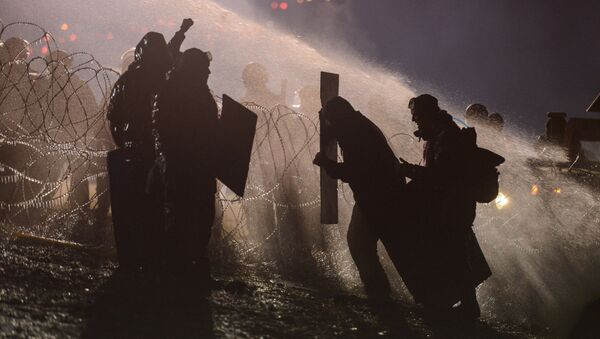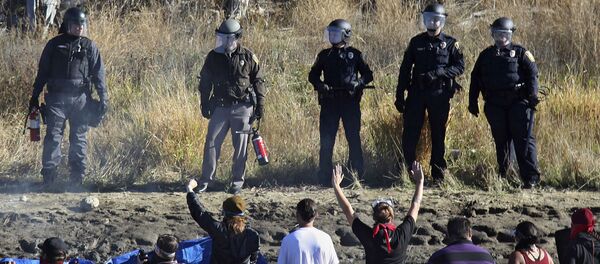In a statement November 27, the Corps said it "is seeking a peaceful and orderly transition to a safer location, and has no plans for forcible removal."
However, "those who choose to stay do so at their own risk as emergency, fire, medical, and law enforcement response cannot be adequately provided in these areas. Those who remain will be considered unauthorized and may be subject to citation under federal, state, or local laws. This will reduce the risk of harm to people in the encampments caused by the harsh North Dakota winter conditions."
The same day, hundreds, led by indigenous Americans, marched in DC to protest the $3.8 billion, 1,200 mile pipeline the Standing Rock Sioux say threatens their drinking water and sacred sites.
— Mariam Baksh (@MariamBaksh) November 27, 2016
The Corps notified the Standing Rock Sioux Tribe on November 25 that protesters would not be allowed to use Corps-managed federal property north of the Cannonball River, which includes the main protest camp, after December 5 without risking trespassing charges.
In the letter to the tribal council, the decision was justified by the need "to protect the general public from the violent confrontations between protesters and law enforcement officials that have occurred in this area, and to prevent death, illness, or serious injury to inhabitants of encampments due to the harsh North Dakota winter conditions."
Standing Rock Sioux Tribe's Chairman Dave Archambault II responded November 26 in a statement saying the tribe was "deeply disappointed" in the decision but remained resolved to protect their water.
In a press panel at the protest camp later that day, he pointed out that the US Army Corps of Engineers is not an enforcement body, and that while the letter served as a notice, he did not expect any kind of eviction force. He counselled protesters to be mindful of the land they occupied as guests.
Archambault also said "I'm hopeful that the president of the United States will take action" to stop the pipeline project.
Clashes between police and protesters have become increasingly violent in recent days, with hundreds arrested and dozens hospitalized with hypothermia and injuries after police turned hoses on protesters in freezing temperatures and fired on them with rubber bullets.
"We are just not going to allow people to become unlawful," said Morton County Sheriff Kyle Kirchmeier told CBS News after a recent clash. "It's just not going to happen."
Law enforcement have consistently described the protesters as rioters; protesters say they are peacefully exercising their first amendment rights.
Archambault said the reservation was looking into building permanent structures for safety and to provide heat during the winter on its lands, particularly in light of police use of water cannons.
The land the Corps intends to close includes the main protest camp, about 50 miles south of Bismarck.




